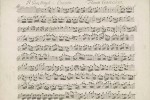 Southampton University musicologist Andrew Woolley was looking through a collection of papers from the Marquesses of Lothian family bought by the National Archives of Scotland in Edinburgh in 1991 when he found a reference to an unnamed Vivaldi score among the papers. When he tracked down the referenced score, Woolley realized that it was the only known copy of a flute concerto called “Il Gran Mogol,” one of a quartet of national concertos all of which were thought lost.
Southampton University musicologist Andrew Woolley was looking through a collection of papers from the Marquesses of Lothian family bought by the National Archives of Scotland in Edinburgh in 1991 when he found a reference to an unnamed Vivaldi score among the papers. When he tracked down the referenced score, Woolley realized that it was the only known copy of a flute concerto called “Il Gran Mogol,” one of a quartet of national concertos all of which were thought lost.
Although the title and composer’s name were clearly marked on the score and even in the archive’s catalogue, nobody realized what a treasure they had until Woolley, a Vivaldi expert, made the connection.
Vivaldi wrote the quartet of concertos in the late 1720s or early 30s. “Il Gran Mogol” was about India, then ruled by the Mughal Empire. Along with the other three — “La Francia” (France), “La Spagna” (Spain), and “L’Inghilterra” (England) — the concertos may have been written as a nationality-themed counterpart of Vivaldi’s most famous work, “The Four Seasons”.
 The document in the National Archives is a published copy from the period of its composition, not the original manuscript, but the last time a reference to published versions of this work appear in the historical record is in the catalogue of a Dutch bookseller in 1759. The fact that copies were still in circulation then suggests that the piece was being performed, but after that, it just faded away.
The document in the National Archives is a published copy from the period of its composition, not the original manuscript, but the last time a reference to published versions of this work appear in the historical record is in the catalogue of a Dutch bookseller in 1759. The fact that copies were still in circulation then suggests that the piece was being performed, but after that, it just faded away.
So how did one solitary score find its way to Scotland? Woolley has researched its possible path for 4 months since he found it in April of this year, and he thinks a flute-playing scion of the Lothian family brought it back home after his Grand Tour.
Il Gran Mogol score was collected in the 1730s by Lord Robert Kerr, the son of the third Marquis of Lothian, during a “grand tour” of continental Europe. On that tour, Kerr, a flautist, is also believed to have acquired three pieces found in the same folder as the concerto.
He died at Culloden in 1746 fighting for government forces against the Jacobites. His whereabouts between 1732 and 1739, when he was commissioned in the army, are not recorded.
Woolley said it was highly likely Kerr went on a cultural tour of Europe, taking in places such as Italy, Germany, France and the Low Countries. “That would have given him the opportunity, like many British gentlemen of the 18th century, to acquire souvenirs of the trip such as the manuscript of a wonderful flute concerto by Vivaldi,” he said.
The score was almost complete, but it was missing the part for the second violin, so Woolley recreated it using a similar concerto that he thinks may have been in part derived from the earlier “Il Gran Mogol”. Now that there’s a working version, the score will be played for the first time in 250 years at a concert in Perth in January.
Here’s a teaser to tide you over until then. This is a small piece of the found Vivaldi concerto played by a flautist at the press conference revealing the find on Friday.
Lovely, isn’t it?